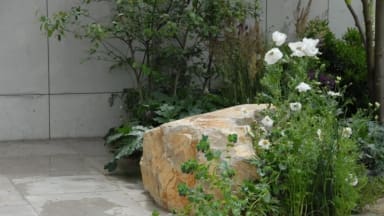
By means of the new, compulsory green audit the gardens were assessed for their green credentials and designers advised how to reduce their environmental footprint. A new entry requirement for all show and sanctuary gardens, the green garden audit is part of a broader push by the RHS to make their events more environmentally friendly.
Carried out by the Oxfordshire based, landscape design firm Nicholsons in association with Malcolm Anderson, RHS head of sustainability, the audit assessed the gardens for the amount of waste created, selection of materials, impact on biodiversity, water and air quality.
“As the UK’s leading gardening charity, we have been making positive changes across the organisation and at our shows to make our practices more sustainable and this is just one example of the progress we are making this year as we continue to make changes to reduce our environmental impact,” explained Anderson. Anderson added that the audit process has enabled the RHS “to better understand the carbon footprint of the gardens at the show”.
According to the RHS, the audit revealed that implemented design changes had a significant impact. Across the two show garden categories, carbon emissions were reduced by 28%. The biggest cuts achieved were made through better choices on building materials and construction methods. Using reclaimed timber instead of cement for example, substantially improved the garden’s environmental credentials.
Matthew Childs, designer of the Terrence Higgins Trust Bridge to 2030 Garden, reduced his carbon emissions by removing block walling in his original design and replacing it with reclaimed timber. Ann-Marie Powell, designer of The Octavia Hill Garden by Blue Diamond with the National Trust, saved a large amount of CO2 by significantly reducing the use of cement.
Liz Nicholson, Nicholsons Nurseries managing director, said: “All of the designers without exception have welcomed the audit and embraced the learnings and worked incredibly hard to adapt and tweak their gardens to reduce the impacts. Many design with the planet in mind and very few changes were necessary. But even these celebrated designers discovered one or two new opportunities and were open-minded to tweak their designs. Designers felt that this process would affect how they design in future and were keen to take their learnings back to their practices.”
For 2024, the RHS has also introduced a new Environmental Innovation Award, which is open to all the gardens that have been through the green garden audit.
Sarah Poll, the RHS head of shows development, said: “The RHS has a responsibility to take a leading role in encouraging everyone to progress and drive environmental innovation and collaborate with the industry to make positive, sustainable changes. We hope by celebrating successes through this new award at our world-famous flower show and showing how small changes can make a big difference through the new green garden audit, we will help continue to encourage positive change.”

